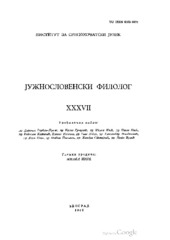Приказ основних података о документу
О неким глаголским конструкцијама у српскохрватском
Some Complement Constructions in Serbo-Croatian
| dc.creator | Којен, Леон | |
| dc.date.accessioned | 2019-05-07T09:49:02Z | |
| dc.date.available | 2019-05-07T09:49:02Z | |
| dc.date.issued | 1981 | |
| dc.identifier.issn | 0350–185x | |
| dc.identifier.uri | https://dais.sanu.ac.rs/123456789/5820 | |
| dc.description.abstract | The central features of Serbo-Croatian complementation may be conveniently brought out by analysing different constructions with да, а syntactic operator whose use in complement structures overlaps that of both that and for in English. Within the framework of an extended categorial grammar (Kojen 1979), да in its relevant uses is naturally treated as a sentential nominalizer and assigned to the category n/S: it takes a sentence as an argument and yields a nominal which then occurs either preverbally, as subject, or postverbally, in a variety of positions, as a complement to different types of verb. When such a nominal occurs in subject position, the sentence optionally undergoes Extraposition which permutes the subject and the predicate; for SVO languages, as Kuno has shown (Kuno 1974), extraposed structures of this kind represent a natural solution to the perceptual difficulties created by center-embedding and the consequent juxtaposition of particles (including nominalizers) which have the function of marking clause boundaries. Rather similarly, when nominalized sentences are embedded under a small but important class of „impersonal” verbs (треба, мора, изгледа, etc.), they optionally undergo Extraction, a transformation which moves the initial constituent of the embedded sentence and places it to the left of the group consisting of the „impersonal” verb and the nominalizer. When the embedded sentence is subject-predicate inform, Extraction is of course just Subject-to-Subject Raising under another name. But, at least for a Slavic language like Serbo-Croatian, the usual name and its implications are clearly misleading since Extraction is just as applicable when the embedded sentence itself canonically lacks a subject: what is fronted by Extraction is the initial constituent of the embedded sentence, whether subject (Изгледа да Ана није тужна -- Ана изгледа да није тужна ), adverbial (Изгледа да овде нема никога -- Овде изгледа да нема никога) or dative nominal (Изгледа да Петру није хладно- Петру изгледа да није хладно). Both Extraposition and Extraction apply optionally to all structures, even those with multiple center-embedding: the latter are excluded by a special filter which marks as ill-formed any string whose associated sequence of category indices contains a sub-sequence (...in/S, n/S, . . .). Араrt from the small class of „impersonal” verbs, which are categorially one-place verbals, S/n, nominalized sentences normally occur as complements to two-place and three-place verbals, (S/n)/n and ((S/n)/n)/n respectively. The former group includes „intentional” verbs, both of the epistemic, believe type and of the non-epistemic, want type (мислити, веровати, знати, желети, хтети, etc.), and the latter various,,control” verbs analogous to promise and persuade (обећати, наговарати, уверавати, дозволити, рећи, захтевати, крити, etc.). It is shown that verbs of both groups undergo Equi NP Deletion, those in the latter group falling into three distinct sub-classes with respect to the problem of „control”: the nominal which „controls” the deletion of the embedded subject is always the main clause subject (very few cases), the main clause object or structurally analogous dative or genitive nominal (наговарати, дозволити, захтевати, etc.), or under differently specifiable conditions either the one or the other (уверавати, рећи, крити, etc.). Да аlso appears with what one might call „operator” verbs, i.e. verbs which from a logical point of view represent either sentential operators (e.g., моћи, смети аnd морати which are roughly equivalent to English can, may and must respectively)or predicate operators (e.g., почети = begin, престати = stop, успети = succeed, etc.). Such verbs should be carefully distinguished, on both syntactic and semantic grounds, from „intentional” verbs subject to Еqui NP Deletion; sentences in which they occur have complex predicates consisting of the ,,operator” verbal („operator” verb plus the nominalizer) and a simple predicate, but there is no reason to construe these as containing a truncated complement clause whose subject has been deleted by Equi. Finally, to mark formally the differences between „ordinary” verbs and verbs which appear in various structures with да, the latter are associated with specific restrictions on permissible derivations: for instance, we shall stipulate in certain cases that at the appropriate step of any derivation for a string containing a form of И the relevant verbal (which may or may not consist of just the given form of V) must take an argument obtained from n/S and S. | en |
| dc.language.iso | sr | sr |
| dc.publisher | Београд : Институт за српскохрватски језик | sr |
| dc.rights | openAccess | sr |
| dc.rights.uri | https://creativecommons.org/licenses/by-nc-nd/4.0/ | |
| dc.source | Јужнословенски филолог | sr |
| dc.title | О неким глаголским конструкцијама у српскохрватском | sr |
| dc.title | Some Complement Constructions in Serbo-Croatian | en |
| dc.type | article | sr |
| dc.rights.license | BY-NC-ND | sr |
| dcterms.abstract | Kojen, Leon; Соме Цомплемент Цонструцтионс ин Сербо-Цроатиан; Соме Цомплемент Цонструцтионс ин Сербо-Цроатиан; O nekim glagolskim konstrukcijama u srpskohrvatskom; | |
| dc.rights.holder | Институт за српски језик САНУ | sr |
| dc.citation.spage | 55 | |
| dc.citation.epage | 89 | |
| dc.citation.volume | 37 | |
| dc.type.version | publishedVersion | sr |
| dc.identifier.fulltext | https://dais.sanu.ac.rs/bitstream/id/18176/kojen.glag.konstrukcije.1981.pdf | |
| dc.identifier.rcub | https://hdl.handle.net/21.15107/rcub_dais_5820 |
Документи
Овај документ се појављује у следећим колекцијама
-
Јужнословенски филолог / Južnoslovenski filolog
ISSN 0350-185X; eISSN 2406-0763

